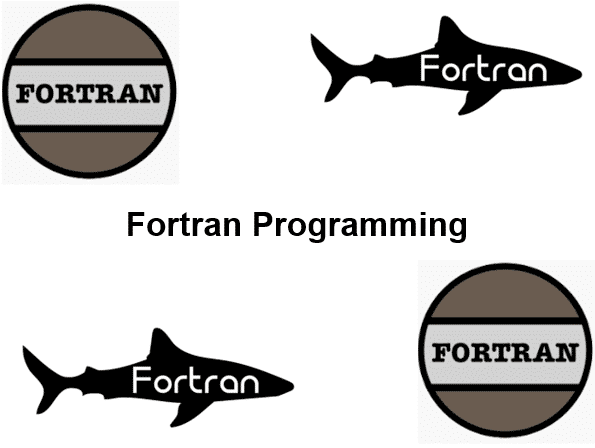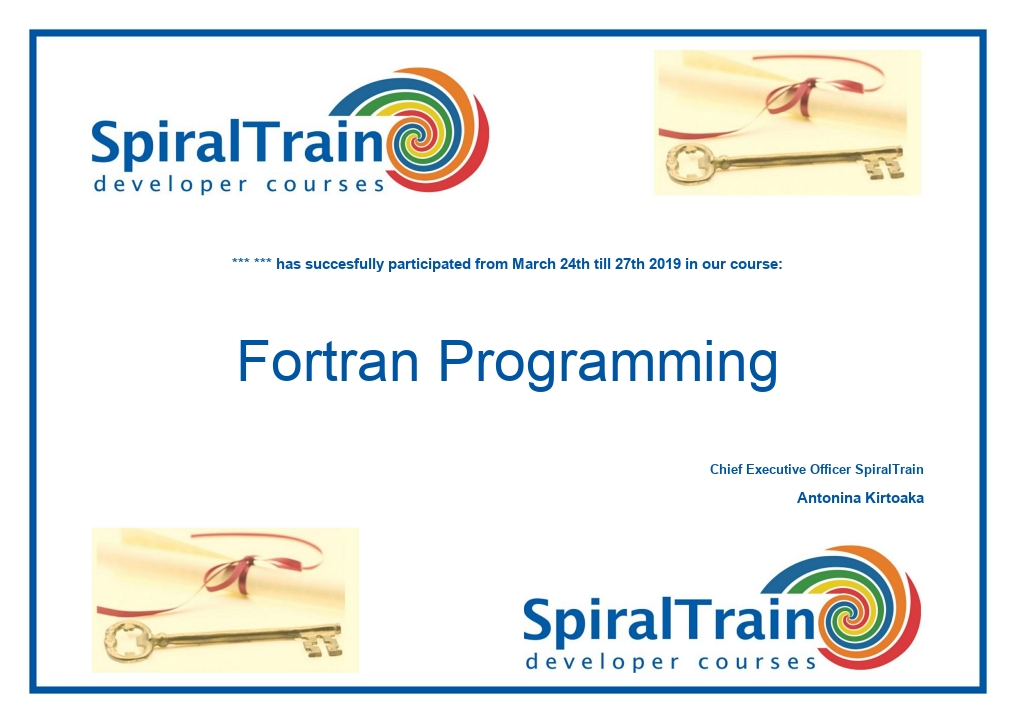-
Learning by doing
-
Trainers with practical experience
-
Classroom training
-
Detailed course material
-
Clear content description
-
Tailormade content possible
-
Training that proceeds
-
Small groups
In the course Fortran Programming from SpiralTrain participants learn to develop applications in the latest version of the Fortran language. Fortran was originally created in 1957 to perform mainly scientific calculations. Over time however, Fortran has evolved into a higher programming language with support for modern concepts such as object-oriented programming.
The course starts with an overview of the development of Fortran and then covers data descriptions, control structures, data processing and Fortran Rules.
Also variables, data types and operators in Fortran are treated. Special attention is paid to Fortran arithmetic with rounding, truncation and integer division.
Subsequently tabular data and arrays are also discussed. Attention is paid to allocatable arrays, multidimensional arrays, array constructors and operations that work on entire arrays.
Fortran naturally also has facilities for accessing the file system. Formatted and Unformatted File I/O are therefore discussed in the course and Records, Data Edit Descriptors and End of Record indicators are treated as well.
Then it's time for functions and control flow in Fortran. Attention is paid to library functions, transformation functions, recursive functions, user defined and pure functions. And the various control flow constructions for selections and iterations are reviewed as well.
Special attention goes to dealing with characters in Fortran. Character Input, Character Operations, Character Sets and Edit Descriptors are discussed.
Finally special types in Fortran such as User Defined Types and pointers are on the program of the course and object oriented programming in Fortran with classes, objects and inheritance is treated.
The course Fortran Programming is intended for anyone who wants to learn how to program in the Fortran programming language.
To participate in this course, basic knowledge of programming in another programming language is beneficial to the understanding but is not required.
The theory is discussed on the basis of presentation slides. The theory is explained further through demos. After discussing a module, there is the possibility to practice. Course times are from 9.30am to 16.30pm.
After successful completion of the course participants receive an official certificate Fortran Programming.

Module 1 : Fortran Intro |
Module 2 : Language Syntax |
Module 3 : Arrays |
|
Fortran Language Fortran's Origins Version 77 to 2008 Fortran Compilers Structured Programming Data Description Control Structures Data Processing Fortran Rules Input and Output |
Variables Names and Values Data Types Fortran Characters Operators Arithmetic Expression Equivalence Rounding and Truncation Integer Division Type Conversion |
Tabular Data Dimension Attribute Setting Array Size Indexing Loop over Arrays Allocatable Arrays Multiple Dimensions Whole Array Manipulation Element Ordering Array Constructors |
Module 4 : File I/O |
Module 5 : Functions |
Module 6 : Control Flow |
|
Opening Files Close Statement Writing Files Formatted and Unformatted Data Edit Descriptors Skipping Lines Records Data Transfer Statements inquire Statement End of Record iostat and iomsg |
Predefined Functions Generic Functions Elemental Function Transformation Functions Function Usage Intrinsic Procedures Custom Functions Local Variables Recursive Functions Pure Functions Rules and Restrictions |
Selections and Iterations Block if Statement if then endif else Statement case Statement do loop do while cycle Statement exit Statement Sentinel Usage forAll Statement |
Module 7 : Characters |
Module 8 : Special Types |
Module 9 : Modules and Classes |
|
Character Input * Edit Descriptor a Edit Descriptor Character Operations Substrings Character Functions len and len_trim Collating Sequence Character Sets scan Function |
Type Definition Variable Definition Nested Derived Types Pointers Pointer Concepts Referencing Pointers Pointer Allocation Pointer Assignment C loc Function Memory Leaks |
Module Syntax Global Data private, public, protected use Statement Explicit Interfaces Classes and Objects Structure Constructors Generic Names Polymorphic Variables Inheritance |
